Well-designed sales contests are fun and healthy ways to motivate your sales team to hit and surpass individual and team goals. By creating a competition with rewards and incentives, sales reps are encouraged to fulfill organizational sales goals by completing the objectives in the sales contest. In this article, we explore 18 sales contest ideas and prizes to increase revenue and inspire your team to achieve your goals.
Sales Contest Ideas
Are you ready to jumpstart your sales team’s engagement and performance? Try any of these creative sales contest ideas and see which one works best for your organization.
1. Getting the Most “No’s”
This particular sales contest is based on one of the main principles of sales where the more “no’s” you get, the closer you get to a yes. Conduct this contest for inside reps doing cold calling campaigns, account executives trying to finalize a pending deal, or account managers making upselling or cross-selling attempts. Regardless, whoever gets the most rejections or “no’s” in the set time period wins the contest.
Getting the most “no’s” encourages reps to make more sales calls as it has no skill-based requirements nor is it evaluated based on production metrics such as leads generated or deals closed. The winner is simply the person who dials the most or sends the most emails to get the most “no’s.” Tracking each “no” is straightforward. If a lead isn’t interested in moving on to the next stage of the sales process, it’s a no.
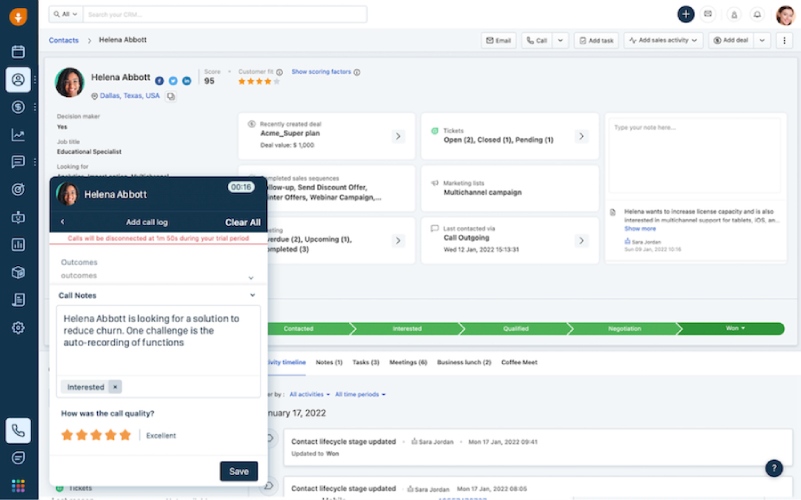
Freshsales automatic call logging feature (Source: Freshsales)
2. Lead Generation Competition
This is one of the best sales competition ideas for businesses looking for a spike in new sales opportunities by holding a lead generation competition. To set even parameters, give each rep a contact list of prospects who are a solid fit for your product or service but have not yet connected with your business.
The reps can then contact those on the list in whichever fashion they wish. Lead generation is qualified if the lead expresses an interest in pricing, moves onto the next sales pipeline stage, or agrees on a presentation or product demo. You might even impose a point system where more points are awarded to different types of leads generated for a particular industry or larger deal size.
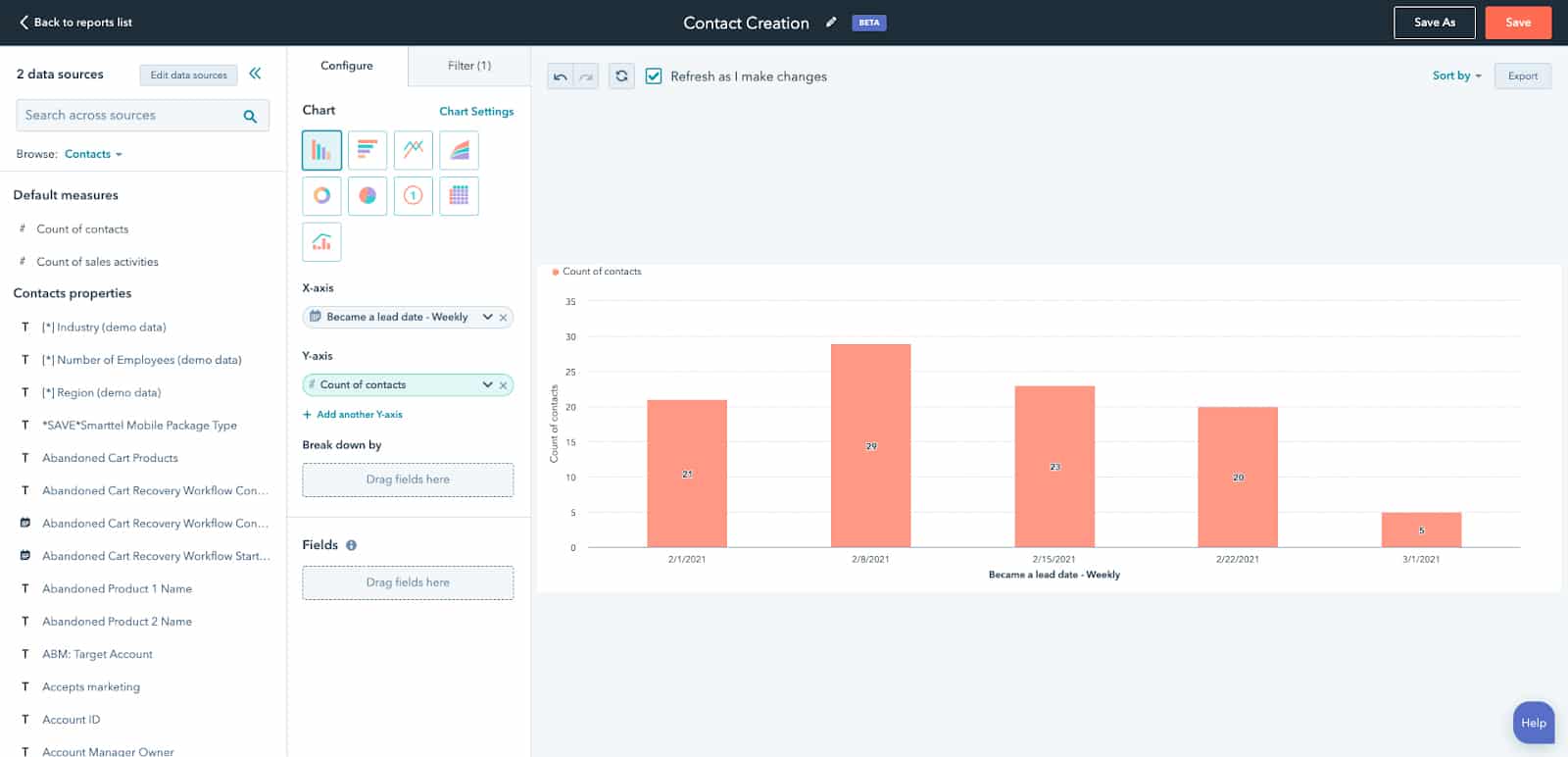
HubSpot CRM custom reporting (Source: HubSpot)
3. “Biggest Loser” Sales Competition Idea
If sales contest themes are structured improperly, a top performer could get ahead of the competition early and prevent other participants from trying to win. This is why a “biggest loser” sales contest works well because you set a minor punishment for the person who takes last each week or month. You can do this by tracking sales activities such as completed cold calls, sales promotion, or production metrics like deals closed.
Each period, the loser has to do a minor punishment such as donate a small amount of money to a company party fund or charity. Keep the consequence at a minimum so that the participants care less about the punishment and more about the title of who is the loser. As long as each rep aims to not finish in last place, you ensure even your lowest performer gives their best effort.
4. Production-focused Contest
A production-focused contest means that the person with the most deals closed or revenue generated wins. It is arguably one of the most traditional yet fun sales contest ideas. However, because of the longevity of certain sales processes, this contest should be done over a longer term such as each quarter or each fiscal year. But by spreading it out longer, you keep the excitement high as someone with a month of low production could make a comeback.
Make sure the prize for winning or placing in this contest is worthwhile. A few additional PTO days or a huge cash bonus are excellent rewards to boost morale among sales reps. While a CRM can be used to track the results, sales gamification software that integrates with a CRM is also an excellent option for running this contest.
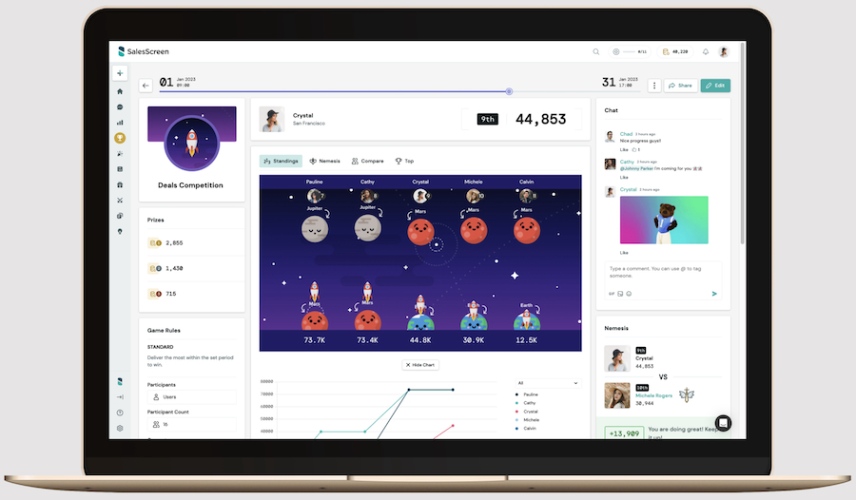
SalesScreen deals competition monitoring (Source: G2)
5. Team-based “Leave Early Friday”
A weekly campaign that encourages collaboration and mentorship between experienced and newer sales reps can be classified as a team-based competition. Set a sales metric such as leads generated, calls made, deals closed, or total sales revenue, and see which team can do the most each week. The winning team members all get to leave early on a Friday the contest concludes.
You can even raise the stakes toward the end of each fiscal quarter by allowing the winning team to take a whole Friday off. Regardless, reps will often put their best foot forward to ensure their team won’t be disappointed in them—especially when an incentive like time off is on the line.
6. Most Improved Challenge
Sales management personnel can use a “most improved” challenge to help individual reps achieve new sales performance heights. For this sales contest, compare an activity- or production-based performance metric over the course of a month, quarter, or year with a previous but equal period of time. Rather than put individuals or teams against each other, each rep is competing against themselves, particularly their past performance.
At the end of the competition, the person with the highest proportional growth or improvement wins the prize. To encourage an equal playing field, you could also use milestones rather than a set winner. For example, everyone who achieves X% improvement wins a prize. This allows even your highest-performing reps to still get an incentive when they perform even better.
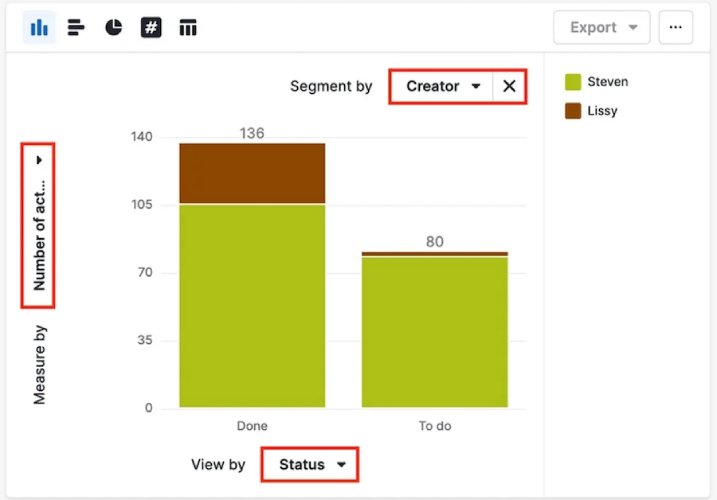
Pipedrive custom activity report (Source: Pipedrive)
7. Milestone Contest
Sales managers often create a contest where only one or a few reps out of dozens of participants win. The problem with this structure is that if one person makes a huge sale early, that blows away the competition, making other participants less eager to keep building momentum. This makes a milestone contest valuable since anyone can earn a prize as long as they hit the milestone instead of directly competing with others.
For example, do a quarterly deals-closed competition that doesn’t reward the person who finalizes the most sales, but every person who closes at least 20 deals. There’s even the option for tiers that gives higher incentives for the next milestones such as a $2,000 bonus for 20 deals, a $5,000 bonus for 40 deals, and a $9,000 for 60 deals. This encourages everyone to continue performing their best as they can get a reward regardless of how others perform.
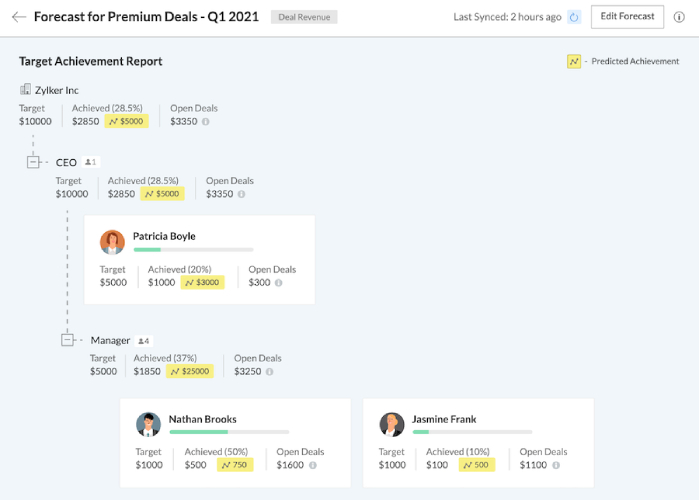
Zoho CRM forecast hierarchy view (Source: Zoho CRM)
8. Cold Calling Race
Rather than rewarding sales reps for how many tasks they complete, measure a contest based on how quickly they perform work, improving their efficiency. For instance, set up a cold calling race wherein the first person or top group to make a certain number of cold calls wins and gets to go home early for the day. You can base it on a number over their sales quota such as 20 additional calls for the day above the 40-call quota for a total of 60.
Keep the competition’s integrity by only counting calls that are answered by the contact. Many employees can get a standard workday’s number of tasks completed in six, five, or even four hours if given the incentive—which is why this competition works so well. Like you would with many of these sales contest ideas, track the results using the CRM activity reporting and confirm legitimate calls using the call logging features mentioned earlier.
9. Behavior Enforcement Contest
Sales team competition ideas don’t necessarily have to revolve around encouraging direct sales activities. These initiatives are also great for encouraging or enforcing behaviors within your sales operations such as fully adopting new sales technology, consistently entering or updating data in a CRM, collaborating more on opportunities and tasks, or completing sales training.
Many of these competitions are used to build and reinforce components of a robust sales culture. To create this office sales contest idea, start by identifying the objective in terms of which specific behavior(s) you wish to enforce. Next, create the incentive or prize and inform the participants of your contest of its associated objective and reward. Then, monitor the results.
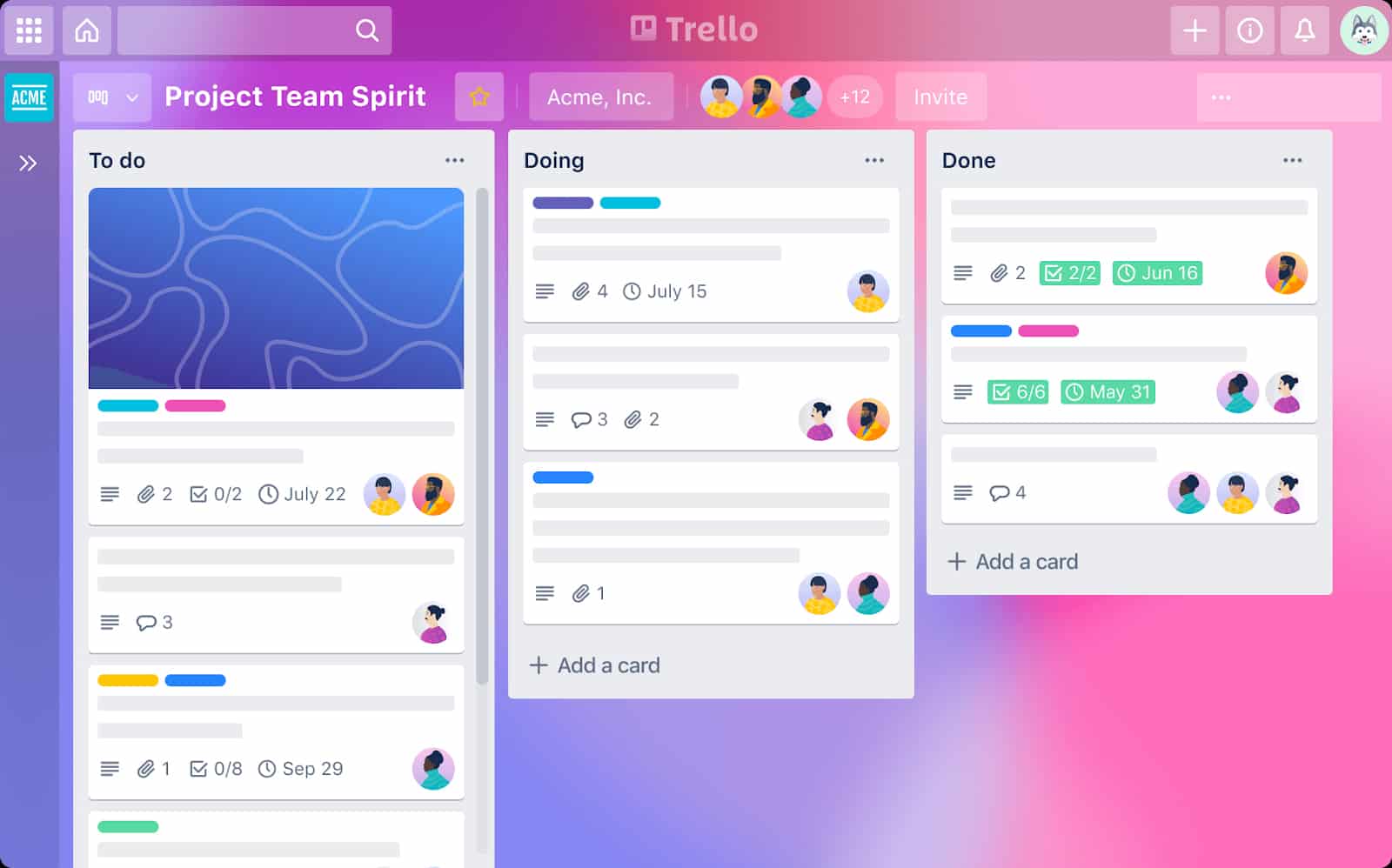
Kanban view of project management in Trello (Source: Trello)
10. Sales Bingo
Similar to ordinary bingo, sales bingo requires you to give out bingo cards with a 5 x 5 chart that’s filled with small goals. The objectives that they could tick off could include making 20 cold calls, booking three product demos, or sending 10 LinkedIn messages. The first rep to mark off five in a row would win a prize. You can run this contest every week, month, or quarter so that it does not stretch out for too long.
Sales Competition Ideas for Prizes
Now that you’ve learned new sales competition ideas, the next step is to determine the rewards for the winners and seek approval from your company executives. Keep in mind that you have to assign smaller prizes to short-term contests and the larger ones to long-term competitions. Here are some examples of motivating sales contest prizes that you can choose for your contest winners.
Cash prizes are one of the most straightforward rewards for sales contests. Simply award the prize in cash to the winner or as an instant credit to their next paycheck. Just make sure that the accounting team is aware of the prize so that they can process it properly.
When choosing gift card prizes, make sure that you buy those that the winner will really use. That said, it is best to inquire first about the interests of the winner to better aid your choice. This prize is also a great way for your company to support a local or partner business. You can give out all-purpose gift cards or choose specific ones for restaurants, gas stations, supermarkets, or spas.
More than just corporate gifts, company merchandise or “merch” can also serve as an excellent choice for a contest prize. The items could vary greatly depending on your company niche, but they should clearly reflect your company logo and branding. Some of the popular choices include insulated tumblers, limited-edition watches, hoodies, shirts, backpacks, tote bags, fitness gear, and custom care kits.
Electronics make great prizes, especially if they are items that the winner can regularly use at home or for work-related tasks. Short-term contest prizes could be anything from a thumb drive, gadget organizer, or external hard drive to a wireless mouse and keyboard set. Bigger prizes could include a coffee maker, electric grill, cellphone, tablet, smart watch, or even a laptop computer.
An extra day off is a valuable and attractive prize for sales reps because it gives them more time to recharge from the pressure of trying to meet sales quotas. This can also be a good way to manage sales burnout and to increase job satisfaction. Another bonus idea to make the extra day off more enjoyable is to pair it with a gift certificate for a movie or meal.
Another great idea for a sales competition prize is an honorary meal with company executives at a high-end restaurant or a formal awarding ceremony. This gives you the opportunity to officially recognize the rep’s efforts in a major endeavor. Recognition can effectively motivate reps to perform better because it makes them feel valued or appreciated. Plus, it can inspire other reps to surpass their current performance so that they, too, will get the chance to be recognized.
This is a fun reward that involves a trophy or plaque that is floated from one winner to the next in a weekly or monthly sales competition. This award is meant to be displayed on the winner’s desk to announce their bragging rights, so make sure to create a trophy with a unique and attractive design. You can also pair it with a smaller reward, usually a small cash prize or a gift card.
Status prizes refer to titles (such as team leaders or managers) or promotions that you can give to top performers or consistent winners of sales contests. Take note that this kind of prize requires careful deliberation since it involves a change in the position and responsibility of the recipient. Promotion is also a good motivator for reps because it tells them that there is room for growth for top performers, not to mention the additional pay that comes with a higher position.
Sales Contest Statistics
When it comes to the effectiveness of utilizing sales contests and gamification in the workplace, don’t just take our word for it. Here are some statistics about sales contests that tell the story of how they can help your business:
- The global gamification market’s compound annual growth rate (CAGR) is projected to be 27.9% by 2032.
- Strategic employee recognition increases productivity by 9%.
- Proper recognition makes employees 73% less likely to feel burned out.
- Only 23% of employees agree that their company has a program for recognizing milestones.
- 84% of US businesses spend $176 billion every year on prizes like award points, gift cards, merchandise, and travel for sales staff, employees, partners, and customers.
- The market for noncash incentives grew by 49% from 2016 to 2022.
- Trips and travels are the top rewards in sales incentive programs.
Frequently Asked Questions (FAQs)
The primary purpose of sales contests is to cultivate an engaging and dynamic work environment for sales reps. This type of environment with healthy competition aims to boost motivation, build teamwork, and drive sales in a given team or department.
Good sales competition ideas should have a specific goal, such as increased revenue for your team. In addition, it should have rules that are easy to follow and incentives that are achievable for all the participants. Moreover, there should be regular status updates on the contest, and the prizes should be handed out at the conclusion of the competition.
To make a sales contest fair, the organizer should ensure that the winner is chosen based on objective measurements of performance. Depending on the nature of the contest, the metrics could be total sales, customer satisfaction scores, or the number of new customer acquisitions. Using measurable metrics diminishes—if not ensures—disputes and bias, keeping the contest fair and healthy.
Bottom Line
Competitions can accelerate both organizational and individual performance through incentives and rewards. These sales contest ideas will help you improve various areas of your sales metrics and operations, whether that be an input of effort or an output of sales production in the form of revenue. By structuring your sales contests properly and taking advantage of CRMs and gamification tools for tracking, you will increase team motivation and productivity.